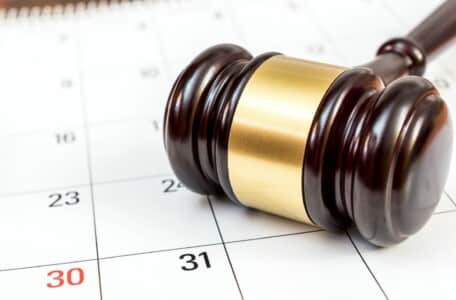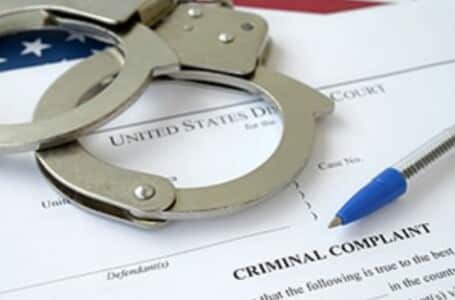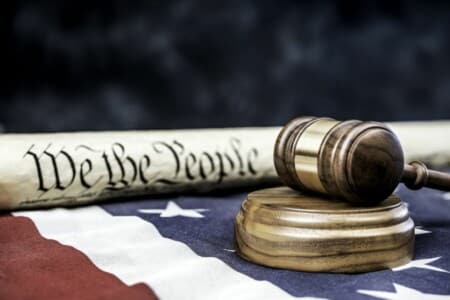The prospect of facing a trial before a criminal court can be daunting for anyone, and the physical and emotional toll this process takes is exhausting. The possible punishments are often harsh, so it’s normal to wonder if there’s a way out before going to court. Fortunately, the answer is yes.
A prosecutor’s job is to prove beyond a reasonable doubt that an accused person is guilty. This job is much easier when there are strong pieces of evidence. On the other hand, your criminal defense lawyer’s job is to look for ways to avoid a trial by carefully examining any evidence and trying to get it thrown out before the case goes to court. This way, the prosecution won’t have anything with which to build their case against you.
Moreover, your defense attorney can make use of a range of persuasive and negotiation techniques that may help you get the charges dropped.
This article will explore eight well-established techniques to get charges dropped before your court date. We’ll also discuss how dismissed charges influence criminal proceedings and understand the difference between an acquittal and dropped charges.
Table of Contents
How To Get Criminal Charges Dropped Before Your Court Date

Getting your criminal charges dropped is a stress-free way to avoid having to go through a formal trial. You may be able to resolve most issues at the prosecutor’s office, and some cases may even result in no legal conviction or out-of-court pronouncements of guilt. This is a great option for people who have been charged with a crime but want to avoid going to court.
Comparably, a case can be terminated in court prior to judgment being declared. This happens during the trial and has similar consequences to charges that are dropped. The only dissimilarity is that both prosecutors and defense attorneys have already taken measures, filed paperwork, and readied their cases for trial. There are two key kinds of dismissal available.
— Show A Lack Of Evidence

In criminal law, evidence is paramount. The prosecutor must show the court evidence that proves beyond a reasonable doubt that the defendant did commit the crime at hand. Most of the time, it is up to the person who is being accused to show a grand jury or judge why they shouldn’t be charged with the crime.
If the prosecutor is unable to prove there’s enough evidence for a trial, your charges will be dismissed. However, prosecutors typically won’t even bring criminal cases where they don’t have sufficient proof. Therefore, in order to avoid this situation altogether, it’s often necessary for your attorney to step in and convince both the prosecutor and District Attorney that there isn’t an adequate basis upon which you should face prosecution based on their police reports.
Your lawyer can produce exculpatory evidence that shows you are not to blame for what happened. For example, your attorney may call forth a witness or present an alibi to support your side of the story, however, keep in mind that it is up to the prosecutor’s discretion whether they accept this testimony if a relationship exists between both parties.
Also, your case will be dropped if the prosecutor finds new evidence that contradicts the current facts and proves that you couldn’t have committed the crime.
— Illegal Stop Or Search

If the stop and search wasn’t done correctly, the prosecutor might have to drop the charges against you. For instance, if a law enforcement officer does not have grounds for stopping someone, then they cannot do so.
Say a police officer pulls someone over and searches them because they are Hispanic and they are driving in an area where most people are white. In this case, this kind of action would be against the law because the U.S. Constitution forbids discrimination based on race or ethnicity.
A search warrant is crucial for any property searches conducted by the police. Still, a search without a warrant can be allowed if there is illegal activity on the property or if there is an emergency. So, when a police officer arrests someone on DUI charges and then checks their car without a warrant, they are not violating anyone’s rights or freedoms. In the same way, officers can legally search a home right away if they hear screams for help coming from inside.
In the absence of any specific legal justification and an officer’s lack of a warrant, any search would be deemed illegal. So, if the state prosecutor tries to bring criminal charges based on evidence found during these kinds of illegal searches, those charges won’t hold up in court.
The law requires police officers to stick to specific protocols when making arrests and other pre-trial actions. If a defendant’s rights are severely violated during these activities, the case could be dropped or the defendant’s eventual sentence could be lessened. Because of this, you must foster a strong attorney-client bond with your lawyer and make sure they know all aspects of your situation in order for them to find a solid reason for dismissal.
A judge can punish a prosecutor if they infringe upon your basic rights, including:
- Right to be free from self-incrimination
- Right to be free from unreasonable search and seizures
- Right to legal representation during interrogations
- Right to cross-examine the witnesses against you
- Right to see the evidence against you
— Plea To A Lesser Offense

Plea bargaining, which is often the smarter choice, can help you avoid a big court case. This is when one pleads to a less serious charge or just one out of many charges. In exchange, you most likely will be offered a lesser sentence and dismissal on other counts.
When there is enough evidence to prove guilt, a lawyer’s best option may be to negotiate a plea deal. For example, if a person is charged with both a Class 5 felony and a few less serious offenses, like a Class 3 misdemeanor, they may only go to jail for the more serious crime.
By negotiating a plea deal, prosecutors can save a lot of time and avoid the long and uncertain trial process. In this win-win situation, both sides get what they want: the prosecutor gets a quick and easy conviction so they can move on with their work, and the defendant gets a shorter sentence for their crime.
In contrast, a guilty plea is also an efficient tactic. In this case, the charges most likely will not be dropped, but instead, it involves admitting guilt and asking the court for leniency.
Negotiating a plea bargain takes more skill than just pleading guilty, but what really matters is how much influence your lawyer has over the judge or prosecutor.
Despite the fact that charges may not be dropped with a plea bargain or guilty plea, it is still beneficial to consider them. Doing so will enable you to reduce the likelihood of having a felony on your criminal record and instead get it reduced down to a misdemeanor — in many instances, even being able to have this erased from your record after some time has passed.
— Errors In The Complaint

Even though it doesn’t happen often, if there were mistakes in the original criminal complaint, you might be able to get your charges dropped. In some cases, these errors are so egregious that they cannot be corrected.
For a criminal charge document, like an arrest form, to be valid, important steps must be taken. For the document to be legally binding, it must be signed under oath by the person who made it. Because of this, if any mistakes are found during or before the trial, the case will not go forward as planned.
So even if there’s a remote possibility that the individual responsible for the case, and therefore the one who drafted the document, is not available or has retired, then it can’t move forward at this moment. Yes, this may be the opportunity of a lifetime, but it needs to be examined thoroughly. Consequently, lawyers have been charged with examining criminal charges diligently and scouring them for errors or omissions.
— No Probable Cause For Arrest

Before the main trial begins, a preliminary hearing is typically held to decide if there is enough evidence for the prosecutor to make the defendant stand trial. For an arrest to be lawful, more than just instinct or job experience must be present; in other words, police officers need probable cause before making an arrest. In much the same way that prosecutors must supply evidence during a criminal trial, this requirement is equivalent.
A police officer needs to get hold of concrete evidence, such as eyewitness accounts or their own observations, in order to make a legitimate arrest. For instance, if a store owner calls the police based on the instinct that a homeless person inside was responsible for some missing items but there is no other supportable proof, then undoubtedly the case would be thrown out since there is no probable cause established.
In cases where a police officer is able to obtain sufficient details of the alleged theft from an eyewitness, probable cause exists for making an arrest.
So, if a police officer arrested someone based on a statement and later found proof, these charges are likely to be upheld in court.
— Unavailable Witness

There are times when prosecuting a case requires the testimony of a key witness or the presentation of physical evidence. Regrettably, if a person cannot be contacted or is unable to show evidence due to death or any other form of incapacity, the charges against them will inevitably be withdrawn and their case dismissed. For example, when a crucial witness passes away or is unreachable, this poses a significant obstacle for even seasoned prosecutors.
Dubious witnesses tend to refuse to testify during a critical part of the trial. In some cases, they might forgo this step for any number of reasons, while in other instances, they may remain silent out of fear that such information could incriminate them and cause further complications beyond the current case.
Some of the ways a witness is brought in or how a person is arraigned may be questioned by the defense attorney. If the court finds any possible legal problems with these procedures, prosecutors will have to stop relying on that one witness, and they may have to drop all charges as a result.
In certain circumstances, the testimony of a witness may not be sufficient to identify the defendant as the perpetrator. In these situations, if there was an eyewitness present at the scene of a crime but they were unable to confirm that it was indeed this particular individual who committed it and other evidence was weak and inconclusive, then all charges against them will typically be dropped by prosecuting attorneys.
— Statute Of Limitations

If your case has become statute-barred, that is an effective way to dismiss the charges against you. The statute of limitations sets a legal deadline for any prosecution seeking to bring a charge based on the offense’s enabling statute. If this time period passes without any action being taken, then those charges can no longer be brought up in court.
The statute of limitations for any case changes depending on your state and type of offense. Generally, infractions must be charged within a year, but misdemeanors can take between one and three years — it all depends on the classification.
Felonies often take the longest of all criminal cases to come before a court, and as such, they possess statutes of limitation ranging from 5 to 15 years in most states. Federal law stipulates this period is five years via 18 U.S. Code § 3282; however, exceptions exist for capital murder and terrorism crimes that are not bound by statute — the prosecutor can pursue these charges whenever they wish without restriction on timeframe or expiration date.
Should the prosecutor move forward with a case against you after the statute of limitations has expired, filing a motion to dismiss is an option. But it’s unlikely that they would go this route because they know that going past the deadline makes it impossible to go to court.
— Agree To Testify In A Larger Case

While it may seem like something only portrayed in films, it is possible for prosecutors to dismiss a charge against you if they see the potential of uncovering more significant evidence. Such opportunities often arise when working on high-stakes cases, and prosecutors face difficulty gathering information. So, you could get prosecutorial immunity if you have relevant information and are willing to work with the prosecutor to solve an investigation.
Typically, this may reduce sentences, and in certain situations, the prosecutor could even drop the charges. For example, they might promise to drop charges against a young person who has never been in trouble with the law before if that person is willing to work with prosecutors to find the main criminal. So, instead of facing the jail time that was once expected, it can now result in community service hours and some fines being imposed.
Whether you want a reduced sentence or to have the charges dropped altogether, your best chance at success is with an experienced defense attorney. They will look at every part of your case to figure out which course of action is best for you. Here are other common strategies that may work:
- Your lawyer can request that the court dismiss the suit on account of prosecutorial delay. Your right to a prompt trial is infringed when proceedings are drawn out, and your attorney will make this case to the judge. For example, Florida prosecutors must submit misdemeanor charges within 90 days of arrest.
- A potential alternative to a trial is negotiating the option for a pre-trial diversion program. In Illinois, this could look like a defendant electing to pursue treatment or monitoring in lieu of proceedings. When all criteria are satisfied, the charges will be dropped completely by the court system.
- Prosecutors might overlook minor offenses due to an absence of resources and a congested criminal justice system. As such, someone who has committed a class D misdemeanor but has no past convictions or demonstrable evidence of good character may be entirely exempted from charges.
Effects Of Dropped Charges In A Criminal Case
Dropping the charges is a very good result because it keeps the person from having to go to court and be punished for a crime they may not have done. If a person is arrested and the charges against them are dropped, they will be released from police custody immediately.
But if the charges were dropped before the trial started, a prosecutor can bring them back as long as they have evidence to back up their case. Let’s say, for instance, that the reason it was dismissed in the first place was because of an absent witness. If this same witness returns before any legal action goes out of date (known as becoming “statute-barred”), then they can bring back the same criminal prosecution. It should be noted, however, that criminal charges previously saved from being dropped during trial cannot return again under any circumstances.
Paying a visit to court, filing paperwork, and defending yourself with the help of your lawyer isn’t necessary if you have had charges dropped or dismissed. Also, not having a criminal record for that particular crime is invaluable; it means that background checks won’t reveal any criminal history about your mistakes.
— Malicious Prosecution
When a case is dismissed or dropped, you may be able to bring legal action against the prosecutor for malicious prosecution. In this case, they have tried on purpose to hurt your reputation and attack you unfairly on a personal level.
At present, prosecuting a case requires strict adherence to legal processes. To win a malicious prosecution claim against a law enforcement agent, you must prove beyond a reasonable doubt that you were unfairly and maliciously targeted. Victorious litigants in these cases can be eligible for monetary compensation through civil lawsuits.
Dropped Charges Vs. Acquittal: What’s The Difference?
Dismissal and acquittal are two distinct outcomes with their own respective implications. When charges are dropped, it means that the prosecutor has no plans to keep going to court, so there can’t be a judge or jury review.
In the legal world, a dismissal means that the court has not found enough evidence to conclude if the defendant is guilty or not. The prosecutor can choose to end the case, sometimes with a plan for a future trial, without making a decision about whether the person is guilty or not.
Although a prosecutor may dismiss your case for lack of evidence, they could still bring charges against you in the future if more evidence is found. In contrast, an acquittal is a definitive ruling after going through the full trial process; it’s as close to absolute certainty as one gets.
When a case is in the trial stage, it can have a variety of outcomes, including:
- When a judge is overseeing the case, they might render their decision to dismiss it due to insufficient evidence or based on no-case submission.
- A grand jury can reach a decision or be unable to, in which case the trial will be ‘hung.’
- A judge can make a pronouncement of guilt and sentence the defendant.
- A judge can make a not-guilty pronouncement.
When a judge renders the verdict of “not guilty,” this is known as an “acquittal.” This means that the defense lawyer showed proof of the defendant’s innocence during the trial, which led to the defendant being found not guilty.
Even though it’s possible the defendant is guilty, the evidence wasn’t enough to prove it beyond a reasonable doubt. In some cases, they might be acquitted of certain charges but found guilty on others, resulting in what’s known as a partial acquittal.
Prosecutors may choose to charge multiple offenses in order to secure a conviction, which could result in only a partial acquittal for the defendant. But this also makes sure that there is no way to appeal the final decision and puts an end to those charges. An acquittal, therefore, serves as an effective method to put an end to a case once and for all.
The Fifth Amendment of the United States Constitution guarantees that no one can be tried twice for a similar criminal offense in the same court. However, there is an exception to this double jeopardy rule: if new evidence emerges after acquittal, a prosecutor may attempt to bring back the case and challenge it further.
— Criminal & Civil Matter
There are occasions when offenses have both criminal and civil implications. In these situations, the state can charge the defendant with a crime while also letting the victim sue for money damages in a civil trial. The objective of pursuing legal action in this capacity is twofold: it seeks retribution against those who breach laws by punishing them through criminal trials, as well as compensating victims monetarily through civil proceedings.
Even if the prosecutor fails to prove guilt in a criminal case and there’s an acquittal, the alleged victim can still take legal action for damages.
— Separate Courts
Although one may be acquitted of a crime in state court, this does not mean that the individual is automatically absolved of it on the federal level. Under the “separate sovereigns” doctrine, prosecutors at both levels can charge and convict someone for committing the same offense.
On the other hand, your state may not allow a prosecutor to bring charges for the same matter in state court after it’s been convicted in federal court. There is no such regulation at the federal level.
Nonetheless, both an acquittal and a dismissal will not be noted on a person’s criminal record.
The Bottom Line
You can avoid the trouble, cost, and emotional stress of a criminal trial by persuading prosecutors that dropping the charges is the best thing to do in your case. Fortunately, your attorney can employ various methods to accomplish this. A good lawyer will be able to come up with a good strategy that will get you back on track with as little trouble and cost as possible.
If you are facing a criminal trial, you should find a reputable law firm or an experienced criminal defense attorney and talk to them about your case. Your lawyer can actively pursue getting the charges dropped if there is weak evidence, illegalities, violations of your constitutional rights, or a statute of limitations.
The difference between dropped charges and dismissals is that dropped charges happen before the trial starts, while dismissals happen during the trial. However, both have similar outcomes. If your charges are dropped, it does not necessarily signify that prosecutors cannot bring the case against you in the future; this differs from an acquittal, which signifies that one has been found innocent by law. As such, this will not be present in any criminal history report when a background check is conducted.
To maximize your chances of success, consulting with a legal expert is essential to strategize the most beneficial approach for your situation. If traditional methods are not applicable in your case, it may still be possible to obtain an acquittal through other creative solutions.
Frequently Asked Questions
What are the steps to getting charges dropped before the court date?
Securing dismissal of charges before the court date can be achieved by either convincing a prosecutor that there is insufficient evidence to make their case or by negotiating with them towards an alternative result instead of going forward with a trial. It all depends on what they deem to be more beneficial.
When you are in trouble with the law, it is important to hire an experienced criminal defense attorney. Your lawyer is in charge of learning about your case and finding out if anything about your arrest or interrogation was done wrong. If there were problems with how these were done, they could bring this up at the trial and weaken or even throw out the evidence that the prosecutor presented.
If a defendant is capable of providing invaluable insight that can assist in the capture and arrest of notorious criminals, an attorney may be able to negotiate with prosecutors to drop any criminal charges against first-time offenders. So, your lawyer can use their expertise to make sure justice is done and keep you from going to jail or paying a hefty fine.
Your criminal defense lawyer has the ability to submit a motion for dismissal based on the grounds of self-defense or factual evidence if your case is beyond the statute of limitations.
What do you do if you’re charged with a crime?
If you are being charged with a crime, you need to take it seriously because the legal consequences can be very serious. Providing evidence against yourself could cause you to end up with a permanent criminal record. If the crime is a felony, the consequences are even worse. Here are some steps that should be taken when charged with any crime:
Remain Silent At All Times
It is important to know that you have a constitutional right to stay silent and to use it. This will protect you from saying anything that could be used against you in court. The Fifth Amendment guarantees every American the freedom from self-incrimination, so if ever taken into custody or called for an interview, make sure your lawyer is with you before saying a single word.
Contact An Attorney
No matter how convincing the police and prosecutor may seem, they are not on your side. The most logical decision is to hire a lawyer as soon as possible. If you are in jail without a lawyer’s representation, you might agree to a plea deal that will hurt you in the long run and can’t be changed. It makes sense that law enforcement officials are more familiar with the complexities of the legal system than the general public, so it’s best to have an attorney by your side during this time.
Be Honest With Your Lawyer
You can have confidence that your attorney is on your side and working to protect you. For this reason, it’s essential to provide them with all the necessary information they need in order to build a strong defense for you. Don’t forget, the more facts about the case that you include, the better chance they will have at devising an effective strategy tailored specifically for you.
Stay Composed
The police might try to intimidate you into saying something that could be used against you. To protect your rights, the best course of action is to remain composed and quiet while in custody.
Also, it’s helpful for your lawyer’s negotiations and pleas to go smoothly if you haven’t antagonized the police.
Know The Specifics Of Your Charges
When your charges are being explained to you, pay close attention. It’s essential that you understand if the allegation is a felony or misdemeanor and which class it belongs to. The more knowledge you acquire, the better equipped you’ll be for what lies ahead.
Post Bail Cautiously
Before making any plans to post bail, especially if the charged crime is a felony, you should always contact an attorney first. They can review your case and figure out whether or not there’s a way for you to be released without posting bail. It may even be possible for them to get the charges dropped altogether. Talking to a lawyer about this could help you avoid spending money on bail that isn’t necessary.
Attend All Court Proceedings
When you’ve been charged with a misdemeanor, it is typically possible for your lawyer to appear on your behalf in court. Though it’s usually best to be at a criminal trial if you can, as this can show that you have good character and may increase your chances of getting a lighter sentence. You could create a calendar for yourself with your legal counsel. Setting aside time from work or other obligations to go to future hearings will make sure you know what’s going on and give you a chance to make a good impression on the judge when it’s needed.
How soon can I get a hearing for my case to get the charges dropped?
If you want to give yourself the best chances of getting your charges dropped and the case dismissed, it’s essential that you move quickly and have a defense attorney review the evidence before trial. Your lawyer will be able to find out if the arrest was done wrong or if there wasn’t a good reason for it, which could be grounds for dismissal. Don’t wait until after your case has gone to court; take action as soon as possible.
On occasion, defendants may also be able to reach a plea bargain agreement. If they accept a guilty plea, some of the charges brought against them can potentially be dismissed.
During arraignment, criminal charges are rarely dropped. The primary purpose of this hearing is to have the case heard for the first time; here, judges do not possess the power to end a situation. Additionally, defense attorneys can submit a motion requesting that prosecutors dismiss their case against the defendant, which can then be discussed by the judge in an arraignment session. Upon finding there isn’t enough evidence against the defendants, the court may grant the motion and terminate the proceedings altogether.

